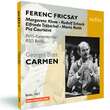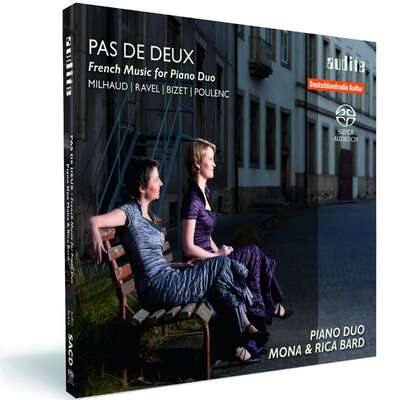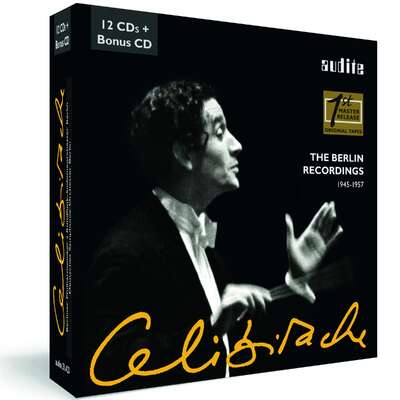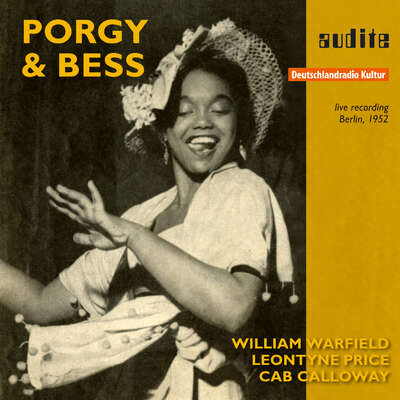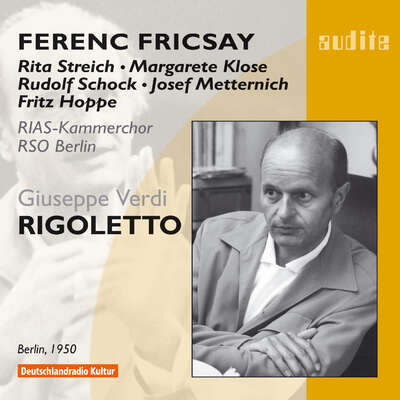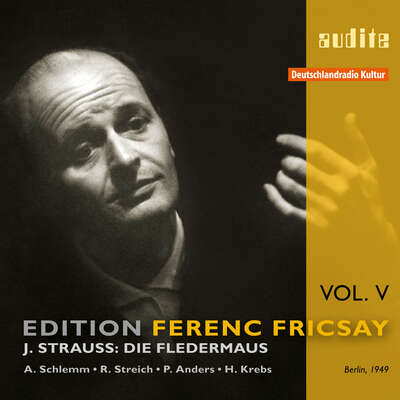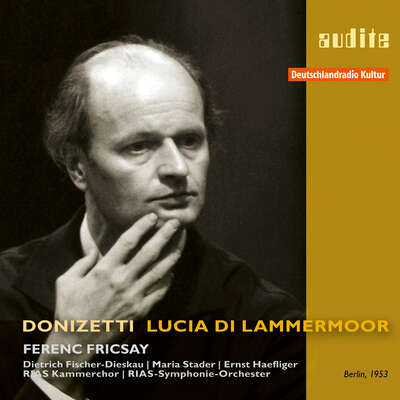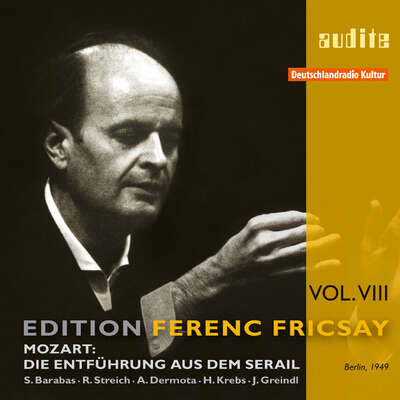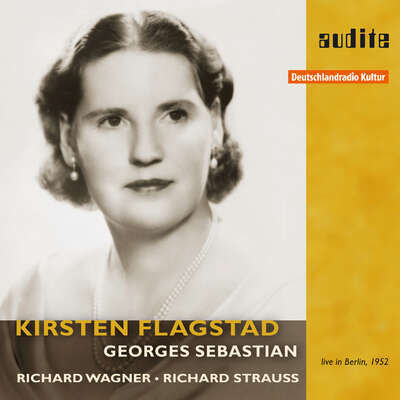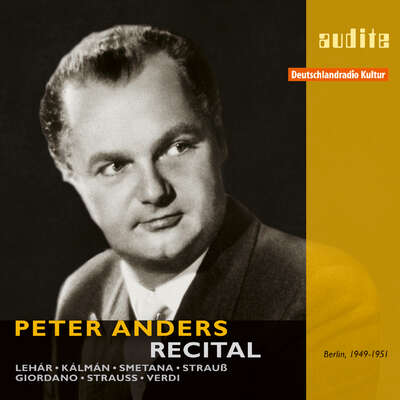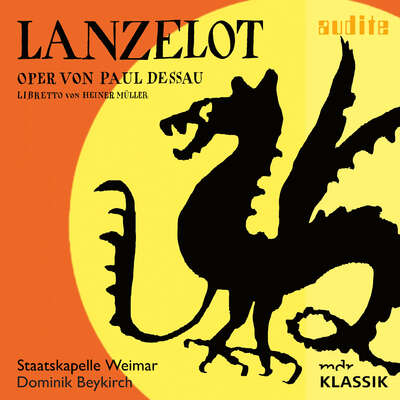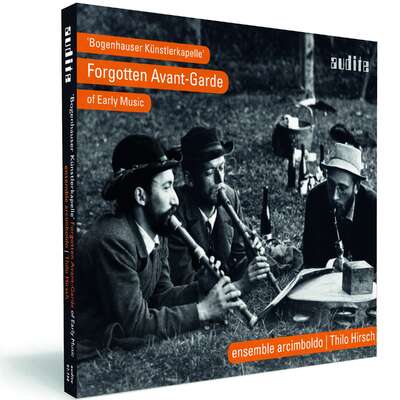
Ferenc Fricsay conducted Georges Bizet’s “Carmen” relatively seldom in the opera house but more frequently in the recording studio. audite presents the first production that Fricsay recorded for the RIAS Berlin in 1951. It contains a compilation of key scenes from the opera. Fricsay’s...more
"This fine series of excerpts transcends its “political” intentions with a performance of enduring, aesthetic understanding. Heartily recommended." (audaud.com)
Details
| Georges Bizet: Carmen | |
| article number: | 95.497 |
|---|---|
| EAN barcode: | 4022143954978 |
| price group: | BCB |
| release date: | 24. October 2007 |
| total time: | 68 min. |
Bonus Material
Informationen
Ferenc Fricsay conducted Georges Bizet’s “Carmen” relatively seldom in the opera house but more frequently in the recording studio. audite presents the first production that Fricsay recorded for the RIAS Berlin in 1951. It contains a compilation of key scenes from the opera. Fricsay’s interpretation possesses a surprising modernity. The orchestra sound is slender and transparent and he picks fresh but not exaggerated tempi. His choice of soloists reveals marked contrasts in character. Fricsay considered recordings to be a synthesis of the arts in which audio engineering played a major role. This recording also demonstrates the extent of evocative effects that could be achieved by monaural means.
You can find a “Producer’s Comment” from producer Ludger Böckenhoff about this CD on our home page. His immediate impressions, jotted down live during the production process, reveal the thoughts going through his mind as he works on the musical material, revealing how he hears and experiences the music. It’s a subjective impression, giving a close and excitingly vivid insight into the production process. In order to preserve the authentic fl avour, we have resisted the temptation to reword this production diary in the style of language more usually employed for press releases.
The “Producer’s Comment” for this CD can be found here.
Reviews
Die Tonkunst | Juli 2013 | Tobias Pfleger | July 1, 2013 Edition Ferenc Fricsay – Werke von Haydn, Mozart, Beethoven, Rossini, Bizet, Brahms, Strauß, Verdi, Bartók u. a.
Ferenc Fricsay gehörte zu den bedeutenden Dirigenten des mittleren 20.Mehr lesen
www.new-classics.co.uk | December 2008 | John Pitt | December 18, 2008
Ferenc Fricsay was born in Budapest in 1914 and studied music under Béla Bartók, Zoltán Kodály and Ernst von Dohnányi. He had a meteoric rise toMehr lesen
Universitas | September 2008, Nummer 747 | Adelbert Reif | September 4, 2008
Der Dirigent Ferenc Fricsay ist heute eine Legende. Im europäischenMehr lesen
Muzyka21 | czerwiec 2008 | Adam Czopek | June 1, 2008
Mimo, że obie opery są dość od siebie odległe stylistyczne, to jednakMehr lesen
Fono Forum | 04/2008 | Ekkehard Pluta | April 1, 2008 Zugstücke und moderne Klassiker
Die Neu- und Wiederveröffentlichungen historischer Opernaufnahmen beschränken sich längst nicht mehr auf das kanonisierte Repertoire, einige FirmenMehr lesen
Für den RIAS hat Ferenc Fricsay eine Reihe von Opernaufnahmen produziert, die durch einen schlanken, federnden, damals überaus modern wirkenden Orchesterklang wie durch ihre rundfunkgerechte Interpretation beeindrucken. Statt großer Oper erlebt man musikalische Kammerspiele. Bei Audite sind jetzt der komplette „Rigoletto“ und eine 70-minütige Kurzfassung der „Carmen“ aufgelegt worden. Trotz der störenden deutschen Sprache können sie als exemplarisch gelten. Wo erlebt man heute noch so viel deklamatorische Deutlichkeit, wo solche Intimität in den Zwiegesängen wie hier bei Rudolf Schock, mal mit Margarete Klose und Rita Streich, aber auch bei dem großen deutschen „Italiener“ Josef Metternich.
Audiophile Audition | March 23, 2008 | Gary Lemco | March 23, 2008
Recorded in Berlin, 3-29 September 1951, this Carmen that selects from allMehr lesen
Ópera Actual | OA 108 (marzo de 2008) | Joan Vilà | March 1, 2008
Hoy en día una Carmen que no sea interpretada en francés parece unaMehr lesen
Diapason | Mars 2008 | Christian Merlin | March 1, 2008
Quitte à avoir des extraits de Carmen en allemand par Fricsay, on aurait préféré voir réédités ceux de 1959 avec l'ébouriffante OraliaMehr lesen
Les Symphonies nos 44 et 98 de Haydn figuraient déjà dans la discographie officielle de Fricsay chez DG, avec le RIAS : considérant que l'orchestre de la Radio de Cologne est moins bon, et que Fricsay m'a toujours paru meilleur mozartien que haydnien, ce volume n'est pas prioritaire. Il n'empêche que le finale de la Symphonie « Tragique » ne manque pas d'allure...
www.classicstodayfrance.com | Février 2008 | Christophe Huss | February 1, 2008
Je n'avais jamais remarqué que Fricsay avait enregistré deux fois lesMehr lesen
Scherzo | Febrero de 2008, Num. 227 | Enrique Pérez Adrián | February 1, 2008 Fricsay y Böhm (II)
Cuatro nuevos álbumes Audite (distribuidor: Diverdi) dedicados a Fricsay yMehr lesen
www.musicweb-international.com | Februar 2008 | Göran Forsling | February 1, 2008
This recording of excerpts from Carmen was made for broadcasting purposes by RIAS Berlin. The reasons for having it sung in German were threefold: itMehr lesen
One might wonder why they didn’t record the full opera when they spent so much effort on the production. Hearing the result it is even more to be deeply regretted, since this is from beginning to end a truly fascinating and engaging reading, first and foremost on behalf of the conductor. Hungarian-born Ferenc Fricsay had a comet-like career directly after the war. In the 1950s he was certainly one of the foremost conductors in Europe, highly regarded in a wide repertoire and possibly Deutsche Grammophon’s premium conductor. Alas he contracted cancer and died in 1963, aged 48. In the field of opera he recorded several Mozart works: Die Entführung, Le nozze di Figaro, Don Giovanni and Die Zauberflöte. His Fidelio is also a reading to place among the best, and I believe he could have made a Carmen to sweep the board with existing versions. The mono sound on this disc is a bit congested but clear and well-balanced and the clarity of Fricsay’s conducting is superb. Extremely well rehearsed, the prelude is both punchy and elegant with lucid textures and rhythmic élan. It is here, and in the three entr’actes and the ballet sequence in act four that he shows what a fine conductor he was. The first entr’acte (tr. 5) is rather brisk but light and airy and translucent, the second (tr. 8) – the one with flute and harp in the opening – is also light with splendid playing from the wind soloists, but maybe the harp is a little too closely balanced. The third entr’acte (tr. 11) is shaped to perfection and the ballet music is a tour de force with a frenetic Farandole (tr. 12) and the Danse bohémienne a winner with its rousing accelerando.
But Carmen is much more than a few orchestral pieces and it is in the vocal numbers that a conductor reveals his dramatic, theatrical mettle; this is also where Fricsay triumphs. He chooses sensible tempos, never drags, keeping in mind that this was originally an Opéra Comique: a Singspiel with a lighter touch than through-composed operas. The fine duet with Micaëla and Don Josë in act one is so lovingly moulded and oh! how the strings glow! The gypsy song in act two is highly charged and he brings out the contrasts in the Card Scene in act three between the light-heartedness of Frasquita and Mercedes and the ominous darkness when Carmen enters.
The singing is a slightly mixed bag but in general it is up to standard. There is no Escamillo, but he wasn’t in Mérimée’s original story either. Frasquita and Mercedes are good and Elfriede Trötschel is a lovely Micaëla, singing with warmth and feeling. Rudolf Schock was a versatile singer. To many he was the leading operetta star of his time but he actually sang anything from Donizetti to Wagner – he was a better-than-average Walther in Rudolf Kempe’s Meistersinger – and his Don José has many virtues. He can be rather stiff and unrelenting at times and his actual tone is on the dry side but he has his lyrical moments where he caresses the phrases lovingly. In the second act confrontation with Carmen he is deeply involved and delivers a lyrical and restrained Flower Song with powerful climaxes –and he ends it softly! It’s a pity that it wasn’t cued separately; as it is it is in the middle of a track that lasts for 12 minutes. He is also moving in the final scene.
And what about Carmen? At the time of the recording Margarete Klose was close to fifty and had a long and distinguished career behind her, best known as a Wagner singer. In the Habanera there are signs of a certain hollowness of tone. This is typical of singers who have had a too one-sided diet of heavy Wagnerian meals, but she is nuanced and the Seguidilla is splendidly alluring. Elsewhere she has a tendency to chop up the musical line with a kind of Wagnerian declamation but it has to be admitted that in the Card Scene she is winning with her Walhalla intensity.
Not perhaps a disc for the general opera-lover who wants all the plums in good readings and modern sound but for admirers of Ferenc Fricsay it is a must. I believe many other collectors will find a lot to admire.
Pforzheimer Zeitung | 22. Dezember 2007 | Thomas Weiss | December 22, 2007 „Carmen“
Einen interessanten Querschnitt von Bizets „Carmen“ hat Ferenc FricsayMehr lesen
klassik.com | Dezember 2007 | Benjamin Künzel | December 18, 2007 | source: http://magazin.k... Fricsays erste ‚Carmen’
An ‚Carmen’-Aufnahmen herrscht kein Mangel, die Anzahl neuerMehr lesen
